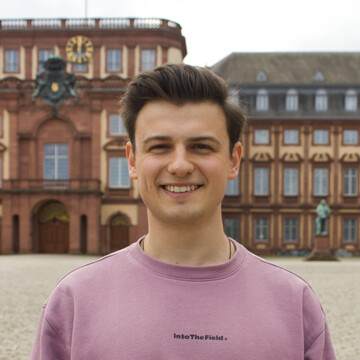Master's Program in History
Program ambassador

Why History?
History from ancient history to modern history: That's what the master’s program in History (M.A.) is all about. On the one hand, we are analyzing topics or epochs from a research point of view. On the other hand, it is a matter of carefully preparing and communicating the results. Important core elements of the course are a module on theories and methods as well as a project module, which is planned for two semesters and where we get our own research area. In addition, there are supplementary modules with related subjects such as Law, Philosophy or Economics, which we can adjust to our specializations.
I study History because it is one of the most diverse disciplines in the Humanities. From political history to economic history to gender studies and everyday research, you can conduct extensive interdisciplinary research.
History at the University of Mannheim
What’s special about the program?
In Mannheim, the master's program in History focuses on research work on the one hand, and on public relations on the other – and this is a special feature compared to other universities. This means that we will have special courses to learn how history can be taught and also test teaching in the project seminar. The project seminar lasts two semesters and we can, for example, design a small exhibition. This gives the program a practical orientation that will make the transition from graduate to young professional easier.
The master’s program is rather small, so we work closely with the other students and lecturers and get to know each other well in seminars with a small numbers of participants. In addition, the Department of History maintains close relationships with non-university institutions such as the Technoseum, the Stadtarchiv and the Reiss Engelhorn Museums. During your studies, you also have the opportunity to take a practice-oriented semester or spend a semester abroad at one of the many partner universities. The university's staff will be happy to help you organize the event.
Extracurricular activities
The rooms and libraries are very modern and well equipped. Outside the lecture halls and seminar rooms, the university makes a great impression with its beautiful campus and the baroque palace, which is centrally located in the city center.
In addition to the degree program, there are other reasons to study at the University of Mannheim: We are particularly impressed by the work of the departmental student committee for History and Classical Studies. The members of the departmental student committee organize many interesting events such as the week for first-year students, the film club, and a city trip. In addition, the departmental student committee is committed to the interests of all history students at the University of Mannheim. In addition to the departmental student committee, there are numerous other student organizations of all kinds that organize events and specialist lectures and in which you can volunteer. Sports enthusiasts are also in good hands at the University of Mannheim: The Institute of Sports offers an extensive sports program. The courses are usually free of charge and you can try almost every imaginable sport – from Pilates to rowing on the Neckar to Lacrosse. Of course, the nightlife is not to be neglected either: In addition to the clubs, bars and pubs in the city center and in the Jungbusch, the Schneckenhof parties, which take place every Thursday on campus and are organized by the individual departmental student committees, are particularly popular.
After graduation
Career opportunities
History graduates can work in museums, archives, in administrative positions, at media companies or in science journalism. An academic career is also open to alumni with a master's degree.
What you need to know
Clichés
Myth 1 – History is just about talking. That is not true. You need to be aware that the program of study requires certain skills: You should be interested in history, like to read, write and discuss things. Generally, the following applies: You’ll grow with your tasks.
Myth 2 – Historians only learn data by heart. That is probably the biggest prejudice. Compared to subjects like Business Administration, you do not need to learn much by heart. While data and facts play a role in studying history, they are not too important. At the beginning of your studies, you will acquire interdisciplinary expertise. But you need to understand and apply this information more than learning it by heart. For example, when you read a source, you should be aware of when this source was created and what developments played a role at that time.
Language requirements
It is definitely recommended to be proficient in English. During the program, we often come across literature and sources that were published in English.
Depending on the region and epoch, other languages may be useful. For example, Latin for ancient and medieval history, French for the modern age or Spanish for the history of the Spanish-speaking countries. However, it is not mandatory for you to have these skills.
Further information
Would you like to learn more about the program in History at the University of Mannheim?
Have a look at the program descriptions:
Would you like to start your studies at the University of Mannheim?
Contact

